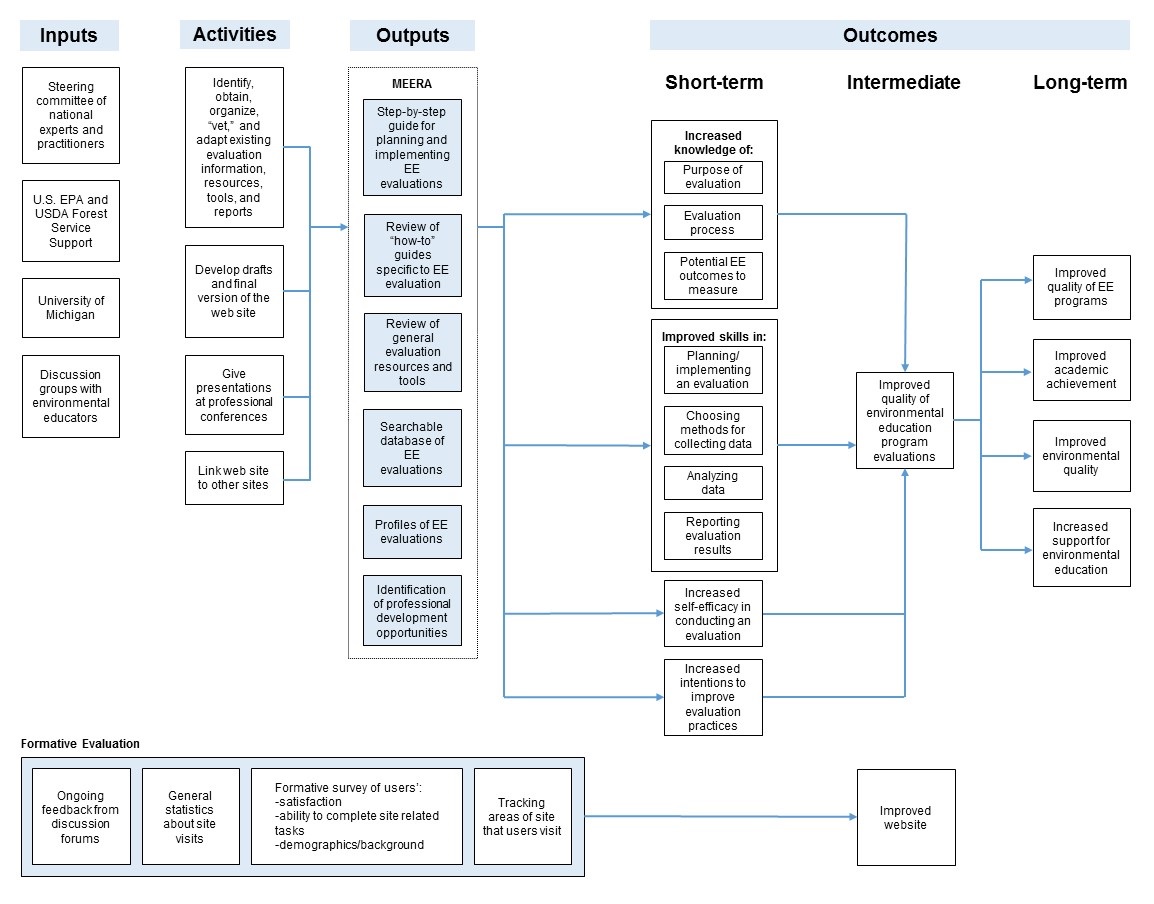What difference are environmental education programs making? How can environmental education programs be improved to better meet their educational, environmental, and human health goals? These are some of the key questions environmental educators and their supporters seek to answer.
Environmental educators recognize that evaluation provides one way through which these questions can be answered, and are therefore interested in conducting evaluations of their programs. Many environmental educators, however, also feel they lack the experience, information, and resources they need to conduct evaluations. My Environmental Education Resource Assistant (MEERA) was created because of this growing interest in evaluation, and to help meet environmental educators' evaluation needs.
MEERA's Goal
MEERA's goal is to support the evaluation efforts of environmental educators. MEERA seeks to meet this goal by facilitating access to relevant information and resources through a single, web-based location. For more information, see MEERA's logic model, below.
MEERA'S Logic Model

MEERA's Principles
MEERA has five guiding principles
- Meet the needs of environmental educators with a range of evaluation experience
Environmental educators' evaluation experiences differ from practitioner to practitioner. In light of this, MEERA seeks to address the different needs of "beginner," "intermediate," and "advanced" evaluators. MEERA uses three different color labels to point environmental educators to information and resources most appropriate for their evaluation skill level. - Focus on program evaluation with an emphasis on measuring outcomes
Though it is important for practitioners to assess program participants' needs and to engage in on-going formative evaluations, MEERA's focus is on supporting summative evaluations. This is because environmental educators and their supporters have indicated that they are most interested in assessing program outcomes and impacts. - Build on existing resources
There is a growing number of quality evaluation information and resources, including ones specifically for environmental educators. MEERA facilitates easy access to these resources by identifying, describing, and organizing them, as well as providing direct links to these resources. MEERA only creates new content and resources when existing ones do not sufficiently meet environmental educators' needs. - Selective, rather than comprehensive focus
Comprehensive websites that attempt to gather every possible resource for inclusion tend to become overwhelming due to their volume of information and complex navigation schemes. To avoid these challenges, MEERA seeks to be selective and attempts to identify the best or most unique resources. - Provide enhanced usability
Website users structure information differently and access websites through a variety of ways. MEERA therefore cross-links information to maximize users' ability to find the information they seek.
MEERA's Features
MEERA is organized to meet environmental educators' needs in the following ways:
- Step-by-step guidance for planning and implementing an evaluation, including tips and pitfalls to avoid as well as unique evaluation examples and resources
- Review of “how-to” guides specific to environmental education (EE) and other evaluation contexts that provide additional examples
- Review of unique evaluation websites and resources that offer more information on evaluation and access to evaluation tools
- Glossary of evaluation terms
- Database of EE evaluation reports that can be searched according to program characteristics and evaluation methods
- Detailed evaluation profiles of select evaluation reports in the database that include information about how evaluation results were used and what lessons were learned
- Structured data presentation
- Resources are hyperlinked
- Search option
- Tips for navigating and using MEERA
MEERA's Development Process
MEERA is made possible by...
- Michaela Zint, University of Michigan
- Andrew Burnett, USDA Forest Service
- Kathleen MacKinnon, U.S. Environmental Protection Agency
- Barbara McDonald, USDA Forest Service
- Elaine Andrews, University of Wisconsin - Madison
- Jack Chin, Blueprint Research & Design Inc.
- Gabriel Della-Piana, NSF Division of Research, Evaluation & Communication
- Deron Davis, Georgia Department of Natural Resources
- M. Lynette Fleming, Research, Evaluation & Development Services
- Rosanne W. Fortner, Environmental Education Consulting
- Peter Gordon, Elachee Nature Science Center
- Joe Heimlich, Ohio State University; Institute for Learning Innovation
- Susan Jacobson, University of Florida - Gainesville
- Deborah Simmons, Northern Illinois University
- Richard Wilke, University of Wisconsin - Stevens Point
- Judy Braus, National Audubon Society
- Elizabeth H. Danter, E. Danter Evaluation, LLC
- Anita Kraemer, eeEvaluations
- Ron Meyers, Ron Meyers & Associates
- Marcella Wells, Wells Resources
- Brian T. Barch, School for Environment and Sustainability
- Beth Covitt, School for Environment and Sustainability
- Jason Duvall, School for Environment and Sustainability
- Amy Higgs, School of Education, School for Environment and Sustainability
- Nick Montgomery, School of Education
- Jennifer Sellers, School for Environment and Sustainability
- Kim Wolske, School for Environment and Sustainability
- Autumm Caines, Eastern Michigan University
- Hsin-Yun Hsieh, University of Michigan, School of Education
- Nick Montgomery, University of Michigan, School of Education
- Paul Nowak, North American Association for Environmental Education
- Ken Wasetis, Contextual Corp.
Feedback for how to improve MEERA has been received from numerous environmental educators including:
- Kimberly Benson, National Oceanic & Atmospheric Administration
- Nadine Bloch, National Oceanic & Atmospheric Administration
- Jennifer Dillard, University of Wisconsin-Stevens Point
- Janice Easton, University of Florida
- Megan Gavin, U.S. Environmental Protection Agency
- Lauren Greene, Dunwoody Nature Center
- Sally Hanft, U.S. Environmental Protection Agency
- Don Howlett, USDA Forest Service
- Becky Jones, Elachee Nature Science Center
- Kristi Kantola, USDA Forest Service
- Rainey Kreis, University of Wisconsin-Stevens Point
- Nate Meyer, University of Minnesota Extension Service
